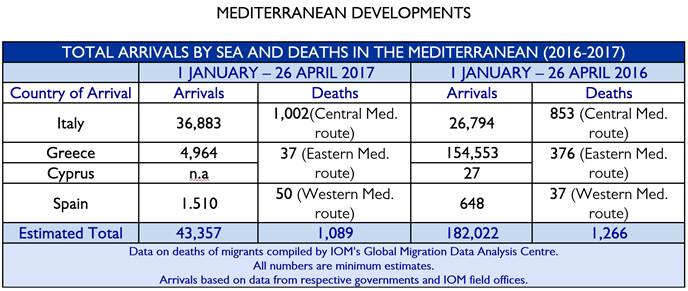-
Who we are
WHO WE AREThe International Organization for Migration (IOM) is part of the United Nations System as the leading inter-governmental organization promoting since 1951 humane and orderly migration for the benefit of all, with 175 member states and a presence in 171 countries.
-
Our Work
Our WorkAs the leading inter-governmental organization promoting since 1951 humane and orderly migration, IOM plays a key role to support the achievement of the 2030 Agenda through different areas of intervention that connect both humanitarian assistance and sustainable development.
What We Do
What We Do
Partnerships
Partnerships
Highlights
Highlights
- Where we work
-
Take Action
Take Action
Work with us
Work with us
Get involved
Get involved
- Data and Research
- 2030 Agenda
Mediterranean Migrant Arrivals: 43,357 in 2017; Deaths: 1,089
Switzerland - IOM, the UN Migration Agency reports that 43,357 migrants and refugees entered Europe by sea in 2017 through 26 April, over 80 percent arriving in Italy and the rest in Spain and Greece. This compares with 182,022 arrivals through 26 April 2016.

IOM Greece reported on Thursday that authorities have no new information about as many as 12 missing migrants who were believed to have been on a boat that capsized off Lesvos earlier this week. IOM had reported seven migrants still missing from the incident in which two survivors were rescued – one an expectant mother. Some media this week reported at least 12 passengers remain missing. According to IOM staff, among those rescued or lost were nationals from Syria, Cameroon and Congo.
IOM Libya’s Christine Petré reported Thursday on information received this week on the remains of 15 migrants buried Wednesday in Bani Walid, north of the city of Alshwareef, one of the cities along the migratory route leading from Libya’s southern borders with Algeria and Niger.
She said “Many migrants travel through the area of Bani Walid and the city of Alshawareef on their way to the capital, Tripoli, and other western coastal cities. The bodies were found along the road or in valleys according to a local NGO in the area that assists the hospital with handling the bodies.”
Before being buried in the local cemetery, the remains of 15 migrants had been kept at the hospital as there was no space in the morgue. According to a local source, at least one victim was shot to death; others succumbed from sickness or from injuries suffered during the journey, such as falling off trucks, Petré said.
Worldwide, the IOM Missing Migrants Project reports that there have been 1,633 fatalities through 26 April (see chart, below), with the Mediterranean region accounting for the largest proportion of deaths – about two thirds of the global total. Nonetheless, this comes to 620 fewer fatalities than were reported up to the same point in 2016. However, these data do not account for full reporting from North Africa and the Horn of Africa, two migration corridors where data collection tends to take longer than in other regions.

For the latest Mediterranean Update infographic:
http://migration.iom.int/docs/MMP/Mediterranean_Update_170428.pdf
For latest arrivals and fatalities in the Mediterranean, please visit: http://migration.iom.int/europe
Learn more about the Missing Migrants Project at: http://missingmigrants.iom.int
For further information please contact:
Joel Millman at IOM Geneva, Tel: +41 79 103 8720, Email: jmillman@iom.int
Flavio Di Giacomo at IOM Italy, Tel: +39 347 089 8996, Email: fdigiacomo@iom.int
IOM Greece: Alexandra Flessa, Tel: +30 210 99 12 174 Email: aflessa@iom.int
or Daniel Esdras, Tel: +30 210 9912174, Email: iomathens@iom.int
or Kelly Namia, Tel: +30 210 9919040, +30 210 9912174, Email: knamia@iom.int
Julia Black at IOM GMDAC, Tel: +49 30 278 778 27, Email: jblack@iom.int
IOM Libya: Othman Belbeisi, Tel: +216 29 600389, Email: obelbeisi@iom.int or Christine Petré, Tel. (Direct): +216 29 240 448, Email: chpetre@iom.int or Ashraf Hassan, Tel +216 29 794707, Email: ashassan@iom.int
For information or interview requests in French:
Florence Kim, IOM Geneva, Tel: +41 79 103 03 42, Email: fkim@iom.int
Flavio Di Giacomo, IOM Italy, Tel: +39 347 089 8996, Email: fdigiacomo@iom.int